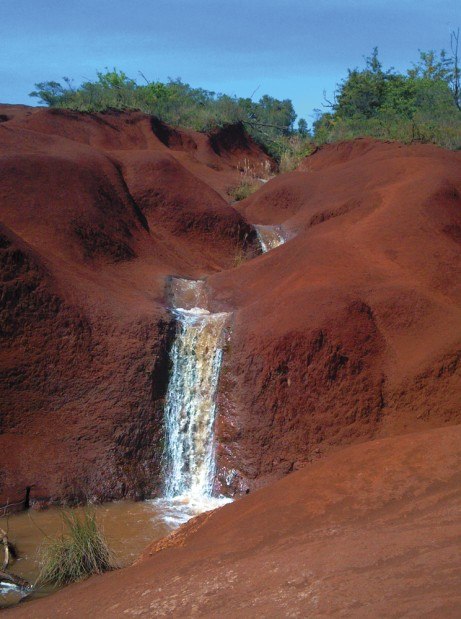KOKE‘E — The Federal Energy Regulatory Commission has exempted a local energy developer from the agency’s permitting process for its proposed 5.3 megawatt small-conduit Puu Lua Reservoir Hydropower Project.
For two years, the Federal Energy Regulatory Commission (FERC) will recognize Konohiki Hydro Power LLC as the sole developer of electricity utilizing the Koke‘e Ditch irrigation system located on former sugar cane lands in the Waimea District on the Westside of Kaua‘i.
Konohiki is a subsidiary of Kaua‘i-based Pacific Light and Power (PLP) and Orenco Hydropower Inc. of Palo Alto, Calif.
“It basically grants us a license while exempting us from the FERC,” said Paulo Luckett, president and CEO of PLP. “It protects us from competition. Nobody can pursue a license there. We have two years to begin construction and four years to be operational.”
The energy produced by the planned upper and lower hydropower facilities will be designed to improve irrigation to adjacent agricultural lands, he said, as well as provide 32.5 gigawatts of renewable energy to the Kaua‘i Island Utility Cooperative grid each year.
In order for PLP to sell its energy to KIUC, it must first have a power purchase agreement with the utility. So far, the co-op has turned his project down, Luckett said.
In January, his power purchase agreement proposal was rejected at a meeting with the co-op’s board of directors chair. He said he was told his project was not in the best interest of the membership.
“We cannot go forward without a power purchase agreement,” Luckett said, adding that Konohiki has conditional agreements for project financing and the condition is the agreement. “The Rural Utility Service will give us debt service financing as long as we have that agreement.”
If the co-op refuses to purchase Konohiki’s power, the developer could appeal to the Public Utilities Commission.
“That is a last-ditch thing,” he said, “and it could be an 18- to 24-month process.”
Konohiki applied for the FERC exemption order in response to a preliminary permit application submitted to the agency for Kokee Ditch waters by a subsidiary of Free Flow Power Inc., a Massachusetts energy developer.
Free Flow Power filed a preliminary permit application with FERC for Kokee in October 2010, even though PLP was already actively involved in developing a project there that would benefit agriculture, as well as create energy.
During that period, Free Flow Power used several subsidiary names and filed multiple FERC applications for preliminary permits on several sites that would provide the company with exclusive rights to explore hydropower on certain waterways for a period of years.
It then entered into a contract with KIUC for an undisclosed amount to transfer the subsidiaries over to the co-op.
FERC on April 12 dismissed with prejudice Free Flow Power’s Clean River Power 16 preliminary permit application for Kokee-related resources.
Luckett said PLP teamed up with Orenco in December. Orenco is an engineering and development firm that provides end-to-end support for small hydropower developers, he said.
FERC can revoke its exemption if construction of the generating facilities has not started in two years or is not completed within four years of the date the exemption was issued on April 12.





